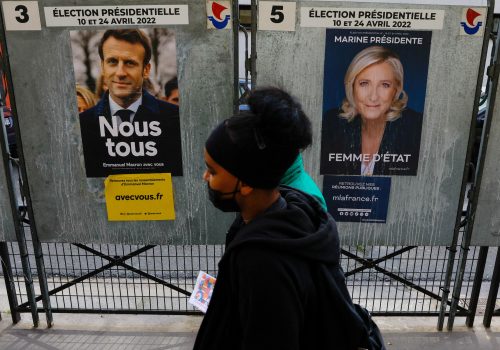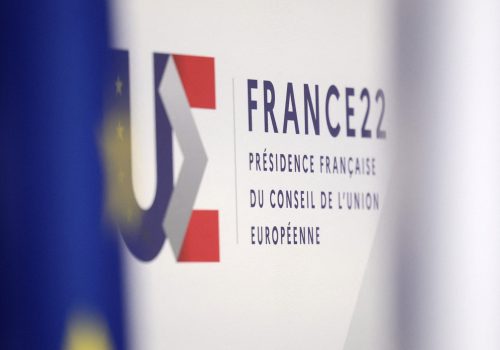Experts react: It’s Macron vs. Le Pen, with Europe’s future on the line
A familiar French face-off is back, this time with even higher stakes. French President Emmanuel Macron’s bid for reelection will culminate in another race against National Rally candidate Marine Le Pen, after they were the top two choices from a large field of contenders in Sunday’s first round of voting. The centrist Macron, who earned more than 27 percent of the vote in preliminary results, will face right-wing stalwart Le Pen, who garnered 23 percent, in a rematch of their 2017 runoff. Macron won that race easily, though this April 24 matchup is shaping up to be much closer amid the war in Ukraine and global economic disruption.
Experts from our Europe Center are here to break down the results and what they mean for France, Europe, NATO, and the world at large.
Gérard Araud: French politics is a field of ruins
David Keating: Le Pen presents an existential crisis for the EU
Marie Jourdain: The political scene has been shaken since 2017
French politics is a field of ruins
The first round of the French presidential election today has confirmed that Macron has not succeeded during his mandate to respond to the political crisis he had taken advantage of in 2017 to be unexpectedly elected. The far-right and far-left candidates got 53 percent of the votes combined while the traditional political parties, the conservative (Les Républicains) and the socialist (Parti Socialiste), which have dominated French political life for decades, sank to under 5 percent and under 2 percent, respectively. As for the Greens, they have not overcome their problem of credibility to become a mainstream party and are stagnating at a mediocre 4.5 percent.
In other words, French political life is more than ever a field of ruins: Macron is leading a centrist block of nearly 30 percent, but his only credible adversaries are extremists.
For the second round, Macron will again face the Le Pen he decisively defeated in 2017, but the circumstances this year are quite different. In 2017, Macron was a fresh face and had no record to defend; now, he is feeding strong hostility in a substantial part of the public, especially among the leftist voters he needs to win. Le Pen has led a low-key campaign focused on household purchasing power at a moment when inflation is becoming a general concern in the country. She has avoided the most controversial aspects of her far-right program and has been served by the competition on her right from another candidate who made her appear nearly moderate.
All polls show so far that Macron should win but with such a small margin that the result may be reversed in the second round of voting on April 24. His victory is anything but guaranteed.
—Gérard Araud is a distinguished fellow at the Atlantic Council and a former French ambassador to the United States.
The view from Brussels: Le Pen presents an existential crisis for the EU
As expected, the French presidential election’s second round will be a repeat of 2017. But here in Brussels, there is a very different atmosphere, as people watch the election, than there was five years ago. In 2017, fresh off the shock victories of Brexit and then US President Donald Trump, people had intense anxieties about the prospect of a Le Pen victory. This year the French election isn’t being very much discussed in Brussels. Obviously, the war in Ukraine is taking up most of people’s attention. But there also seems to be a feeling of inevitability for Macron’s reelection—a feeling somewhat reinforced by Macron’s somewhat comfortable lead of more than 4 percentage points over Le Pen in the first round, despite recent polls suggesting a possible tie. There were 2.7 percentage points between them in the 2017 election’s first round.
That being said, a Le Pen win would be no less of an existential crisis for the European Union (EU) now than it was in 2017. The timing would probably be even more serious given the war in Ukraine and Le Pen’s ties to Russian President Vladimir Putin. France is the only significant military power in the EU. It holds the union’s only permanent seat on the United Nations Security Council and is the only EU member that is a nuclear power. If France were to pull out of the efforts to sanction Russia, it would be a body blow to the West.
The very future of the EU would be in doubt. Le Pen no longer calls for France to leave the EU—almost all of the far-right in Europe stopped doing that after they observed the effects of Brexit. But she has said she wants to deconstruct the EU from within and that her first foreign visit as president would be to Brussels to demand immediate work on revising the EU treaties. She would join with her allies in the Polish and Hungarian governments to do so. The prospect for NATO is no less gloomy. Le Pen has called for France to pull out of NATO’s integrated command structure “so as to be no longer caught up in conflicts that are not ours.”
Despite the likelihood of this election being a closer race than the one in 2017, there is less anxiety and less attention being paid than five years ago. It may be that people in Brussels just don’t have the bandwidth right now to think about the prospect of a Le Pen presidency, which could very well lead to the collapse of the EU. The attitude right now: Let’s cross that bridge when we come to it.
—Dave Keating is a nonresident senior fellow at the Europe Center and the Brussels correspondent for France 24.
The political scene has been shaken since 2017
The French people have set up the same match as five years ago, with Macron running for a second term against the far-right Le Pen. The third-place candidate is also the same: Jean-Luc Mélenchon (far-left). So it is all the same? No, the turmoil of the French political scene is real.
The composition of the country’s political forces has been shaken. First, the two historical parties of the French Fifth Republic, which produced seven out of eight presidents since 1958 (Macron being the exception), are not only not in the second round, but they are far from it, with less than 5 percent of the votes. This will cause serious economic consequences for these parties, as public reimbursement for the campaign goes only to those parties that garner 5 percent of the vote. Second, the far-right is the leading political force in the country (around 30 percent of the vote), ahead of the center (Macron’s party with 27 percent) and the divided left (under 30 percent).
Sunday’s vote offers two main lessons: First, the campaign’s lack of enthusiasm translated into a lack of mobilization, with 25 percent of eligible citizens deciding not to vote. That is the second-highest abstention number since French citizens started electing their presidents (although not as high as feared). Second, Macron, Le Pen, and Mélenchon all performed better than in 2017, which is a result of many voters opting for a “tactical” vote. That means that voters, knowing their favorite among the twelve candidates was not likely to win, chose the candidate most likely to perform well. As such, it is important not to overestimate support for the candidates’ policies.
What is next? Except for the other far-right candidates, all the candidates stated that they will not vote for Le Pen. Yet, it is uncertain if their voters would be on the same wavelength. Monday starts a new campaign. In a context where the war in Ukraine still dominates the news, the French people expect the president to engage on the domestic scene and participate in the debates over the next couple of weeks. The remaining two candidates must win over voters who did not vote for them. As such, the result of the second round remains unknown. And whatever the results, the parliamentary elections in June will be critical for the winner to implement his or her chosen policies.
—Marie Jourdain is a visiting fellow at the Atlantic Council’s Europe Center and previously worked for the French Ministry of Defense’s Directorate General for International Relations and Strategy.
Further reading
Fri, Apr 8, 2022
French Election Dashboard: Everything you need to know about the presidential race
Trackers and Data Visualizations By
France will hold the first round of the 2022 Presidental Elections on Sunday, April 10, 2022. If no single candidate wins a majority after the first round, the two candidates who secured the most votes will participate in a runoff on Sunday, April 24, 2022.
Thu, Apr 7, 2022
How will Russia’s war in Ukraine reshape the European political scene? Look to France.
New Atlanticist By Marie Jourdain
France's presidential elections this month represent an important barometer of the strength of European populism. Here's how the war has already shaken the campaign.
Mon, Feb 7, 2022
France’s new mantra: liberty, equality, digital sovereignty
New Atlanticist By Kenneth Propp
Digital sovereignty is a driving force in European policy debates—and the ripple effect of decisions taken in Brussels will be felt across the pond.
Image: A combination picture shows portraits of the two candidates running for the second round in the 2022 French presidential election, Marine Le Pen, leader of French far-right National Rally (Rassemblement National) party, and French President Emmanuel Macron, candidate for his re-election. Pictures taken February 5, 2022 (L) and April 2, 2022. Photo by Sarah Meyssonnier/Reuters.


